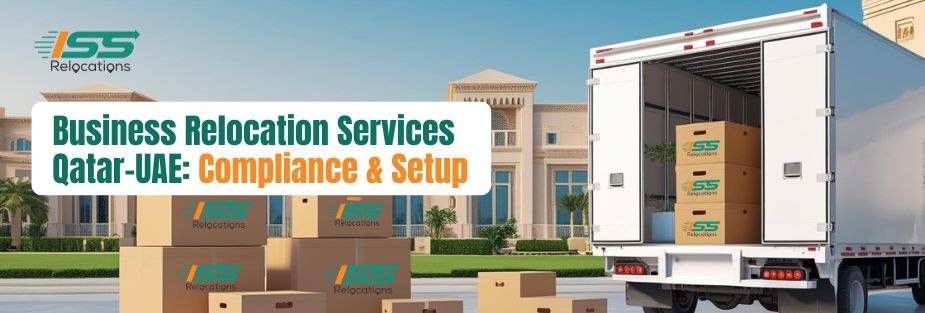
Tips for Moving Services to Kuwait City
For expats looking for moving services to Kuwait City, here are some tips to help you navigate your way.
Whether you’re relocating for your job, or family, or just for a change, Kuwait City welcomes expats with open arms. The city offers expats a blend of rich culture, history, and modern amenities to carry a good lifestyle.
But, such a journey comes with its challenges—from finding the perfect place to stay and understanding local customs to dancing to the city’s rhythm.
Which is why we are here. Our guide aims to simplify your move to Kuwait City by guiding you on steps like visas and accommodation to socializing and exploration. To further ease your transition, ISS Relocations provides personalized international moving services, ensuring a hassle-free relocation experience.
So, let’s get started on making your move to Kuwait City as seamless and enjoyable as possible.
Get Your Paperwork in Order Early
When moving to Kuwait City, the first thing to take care of is making sure all your paperwork is in order. This might sound boring, but it’s super important! You don’t want any surprises that could delay your move. Here’s how to make this process smooth:
Know Your Visa:
Depending on why you’re moving, you might need a different kind of visa. There are tourist visas for short visits, work visas if you’re coming for a job, and dependent visas for families moving together. Each type has its own requirements, so check which one you need.
Start Early:
The process of getting your visa and residency can take longer than you expect. Starting early means you won’t be biting your nails and waiting for paperwork when you should be packing your bags.
What You’ll Need:
- A valid passport: Make sure it’s not expiring before you anticipated.
- Visa application: Filled out correctly.
- Passport photos: You’ll need a few, so smile!
- Health certificate: Some visas require a check-up from an approved clinic.
- Letter from your employer: If you’re moving for work, this is a must.
Residency
Once you land in Kuwait with your work visa, you’ll need to apply for residency to stay longer. This is when you officially become a part of Kuwait City!
A Handy Checklist:
Keeping a checklist of what you need and what you’ve already done can help keep things organized. It’s like a roadmap that guides you through the whole process.
Ask for Help:
If you’re feeling overwhelmed, don’t worry! There are professionals and expat communities who can offer advice and help you through the process. Sometimes, a little help can make a big difference.
The Golden Tip:
Keep copies of all your documents, just in case. It’s always good to have backups!
Getting your paperwork sorted is the foundation of your move to Kuwait City. Once that’s out of the way, you can focus on the fun parts of moving, like imagining your new life in this vibrant city. So, take a deep breath, get organized, and you’ll be on your way to an exciting new chapter in Kuwait City!
Choose Your New Home Wisely
Finding the perfect spot to live in Kuwait City can turn your expat experience from good to great. It’s not just about having a roof over your head; it’s about creating a space where you feel comfortable, safe, and happy. Here’s how to make sure you find the right place:
Explore Different Areas:
Kuwait City has many neighborhoods, each with its own vibe and community. Some areas are bustling with cafes and shops, while others are more residential and quieter. Before you decide, explore a bit. Think about what’s important to you—do you want to be near work, or is having a park nearby for morning jogs more your style?
Rent Before You Buy:
It’s a good idea to rent first, especially if you’re new to Kuwait. This gives you the flexibility to move if your first choice isn’t right. Renting also lets you get a feel for different areas without a long-term commitment.
What to Look for in a Rental:
- Location: Consider your daily commute and the amenities nearby.
- Size and Layout: Make sure it fits your needs. Do you need an extra room for a home office?
- Budget: Be clear on how much you’re willing to spend. Remember to ask about additional costs like utilities.
You May Also Like: Your Ultimate Moving to Canada Checklist
Get to Know the Lease Terms:
Leases in Kuwait typically run for one year. Understand what you’re agreeing to, such as what happens if you need to move out early. Don’t hesitate to ask questions or seek clarification.
Utilize Resources:
There are plenty of online listings and real estate agents ready to help expats. Websites can give you a good idea of what’s available, and agents can help you navigate the local housing market.
Ask the Expat Community:
Sometimes the best insights come from people who’ve been in your shoes. Expat forums and social media groups can be gold mines of information on where to live, where to avoid, and tips on getting the best deal.
A Tip to Remember:
When you find a place you like, take a moment to visit at different times of the day. A quiet street in the morning might be busy in the evening. It’s also a chance to chat with potential neighbors and get a feel for the community.
Dive Into the Local Culture
Embracing the local culture is key to truly enjoying your life in Kuwait City. It’s not just about visiting the places you see in guidebooks; it’s about immersing yourself in the daily life and traditions of this vibrant place. Here’s how you can dive deep into Kuwaiti culture and make your expat journey even more rewarding:
Learn Some Arabic:
While English is widely spoken, knowing basic Arabic phrases can go a long way. It shows respect for the local culture and can help you in daily interactions. Simple greetings, thank you, and how to ask for directions can open many doors and smiles.
Dress Respectfully:
Kuwait is a conservative country, and dressing modestly is a sign of respect. For women, this means avoiding too-short skirts and sleeveless tops, while men should avoid walking around shirtless outside of beach areas. When in doubt, err on the side of conservatism.
Explore Beyond the Expats:
It’s comfortable to stick with what’s familiar but try to step beyond the expat bubble. Try local foods, attend cultural events, and visit places that Kuwaitis enjoy. You’ll gain a richer understanding of the country and its people.
Understand the Customs:
Kuwaiti culture is warm and hospitable, but there are customs to be aware of. For instance, always use your right hand for eating and greeting. If you’re invited to a Kuwaiti home, it’s customary to bring a small gift, like chocolates or flowers.
Be Open and Curious:
Ask questions and show interest in learning about Kuwaiti traditions and history. Most locals are proud of their heritage and happy to share it with newcomers. This curiosity can lead to meaningful friendships and deeper cultural insights.
Participate in Local Festivals:
Kuwait has numerous festivals and national holidays that are celebrated with great enthusiasm. Participating in these events can be a fun way to experience the culture and meet new people.
A Tip for the Curious:
Try to visit the local souks (markets). They are a bustling hub of culture, where you can find everything from traditional crafts to local foods. It’s a colorful experience that offers a taste of the local lifestyle.
Navigate the Healthcare System
Understanding how healthcare works in Kuwait City is crucial for your peace of mind. The country offers high-quality medical services, but it’s important to know how to access them and what to expect. Here are some pointers to help you navigate the healthcare landscape:
Get Health Insurance:
Before you move, make sure you have comprehensive health insurance that covers you in Kuwait. Some employers provide this as part of your package, but if they don’t, you’ll need to arrange it yourself. Check what’s covered, especially for any pre-existing conditions.
Register for a Civil ID:
Once you have your residency, apply for a Civil ID. This is essential for accessing healthcare services in Kuwait. With a Civil ID, you can register at a local clinic, known as a “polyclinic,” which will be your first point of contact for most medical needs.
Know Where to Go:
For general health issues, your local clinic is the place to start. Kuwait also has specialized hospitals and clinics for more serious concerns. In an emergency, public hospitals provide immediate care to everyone, regardless of nationality or insurance.
Bring Your Medical Records:
If you have ongoing health issues, bring your medical records with you. This will help your new doctor understand your health history and provide the best care possible.
Pharmacies Are Handy:
Pharmacies in Kuwait are well-stocked and can provide over-the-counter and prescription medications. For prescriptions, you’ll usually need to see a doctor first.
Respect the Culture in Healthcare:
Kuwaiti healthcare professionals are highly trained and respectful of privacy and cultural sensitivities. It’s important to show the same respect in return. For example, female patients preferring female doctors are common, and accommodations are often made.
A Tip for Families:
If you’re moving with children, look into pediatric care and any necessary vaccinations they might need. Kuwait has excellent pediatricians and child healthcare services.
Schooling for Your Kids
If you’re moving to Kuwait City with children, figuring out their education is a top priority. Kuwait offers a range of schooling options that cater to different languages and curriculums, ensuring a smooth transition for your little ones. Here’s how to navigate the schooling system:
Research Early:
Start looking into schools as soon as you know you’re moving. International schools are popular among expats because they often offer curriculums from your home country or internationally recognized programs like the International Baccalaureate (IB).
Consider the Curriculum:
Think about whether you want your child to continue with a familiar curriculum or immerse themselves in a new educational system. Kuwaiti schools offer high standards of education, with Arabic as the primary language of instruction, which can be a great opportunity for your child to learn a new language.
Visit Schools:
If possible, visit the schools on your shortlist. This gives you a feel for the environment and allows you to ask direct questions about class sizes, extracurricular activities, and the school’s approach to integrating new students.
Application Process:
Be prepared for an application process that may include interviews, entrance exams, and a review of your child’s previous school records. Start this process early to increase your chances of securing a spot in your preferred school.
Consider the Location:
Think about the school’s location in relation to where you’ll be living and working. Traffic in Kuwait City can be heavy, and a convenient location can make daily commutes easier.
Engage with Other Parents:
Connecting with other expat parents can be invaluable. They can offer firsthand insights into the best schools and tips on navigating the application process. There are many online forums and social groups where you can find support and advice.
A Tip for Integration:
Encourage your child to participate in extracurricular activities and social events at school. It’s a great way for them to make friends and adjust more quickly to their new surroundings.
Ready to Move to Kuwait City?
Contact us now and start planning your hassle-free relocation!
Understand the Work Culture
Adapting to a new work environment is a significant part of moving to Kuwait City, especially since the work culture might differ from what you’re used to. Understanding and respecting these differences can help you settle in more comfortably and make your work experience enjoyable. Here’s what you need to know:
Respect for Hierarchy:
Kuwaiti workplaces often have a clear hierarchy, with a strong respect for positions of authority. It’s important to understand this structure and communicate accordingly.
The Importance of Relationships:
Building personal relationships and trust is key in the Kuwaiti work culture. Take the time to engage with your colleagues and business partners beyond just work-related discussions.
Business Hours and Breaks:
The workweek in Kuwait typically runs from Sunday to Thursday, with Friday and Saturday as the weekend. Working hours can vary, especially during Ramadan, when the workday is shortened. Be mindful of prayer times as well, as businesses may close briefly.
Dress Code:
Professional attire is expected in most workplaces. Considering Kuwait’s conservative culture, it’s advisable to dress modestly.
Meetings and Negotiations:
Meetings may not always start on time, and negotiations can take longer than anticipated. Patience and flexibility are valued.
Communication Style:
While direct communication is appreciated, it’s important to also be polite and respectful. Avoiding public criticism and understanding the nuances of saying ‘no’ without offending someone is part of navigating the work culture successfully.
A Tip for Success:
Show initiative and willingness to learn, but also be ready to listen and adapt to the local way of doing things. Embrace the opportunity to learn from a new culture.
Get Around Easily
Getting around Kuwait City might seem daunting at first, but with a little know-how, you’ll be navigating the streets like a local in no time. Understanding your transport options can make your life a lot easier and your experience in Kuwait more enjoyable. Here’s what you need to know:
Driving:
Many expats choose to drive in Kuwait. The road network is extensive, and having a car can offer you freedom and flexibility. However, traffic can be heavy, especially during peak hours. If you plan to drive, you’ll need to get a Kuwaiti driving license. You can use an international driving permit temporarily, but eventually, you’ll need to switch.
Public Transport:
Kuwait’s public transportation system includes buses that cover most areas of the city. It’s affordable and can be a good option for getting around, especially if you take the time to understand the routes. However, services can be less frequent than what you might be used to.
Taxis and Ride-Sharing:
Taxis are widely available, and ride-sharing apps also operate in Kuwait City. They can be a convenient way to travel, especially if you’re not familiar with the area or if you’re heading somewhere not covered by public transport. Always check that the taxi meter is on or agree on a fare in advance to avoid surprises.
Walking and Cycling:
In cooler months, walking or cycling can be pleasant, especially in areas with amenities nearby. However, keep in mind that Kuwait is designed more for cars than pedestrians, so this might not always be practical.
A Tip for Exploring:
Spend some time getting to know the area around your home and workplace. Finding out where the nearest grocery store, pharmacy, and other essentials can help you feel more settled and confident moving around.
Manage Your Finances Smartly
Getting a handle on your finances is crucial when moving to Kuwait City. From opening a bank account to understanding local currency and managing expenses, here’s how to stay financially savvy in your new home:
Open a Local Bank Account:
This should be one of your first steps after arriving. A local account will make day-to-day transactions easier, help you manage your bills, and possibly save on international transaction fees. Look into banks that offer services in English and understand the needs of expats.
Understand the Currency:
The Kuwaiti Dinar (KWD) is the local currency, and it’s one of the highest-valued currencies in the world. Familiarize yourself with the notes and coins, and always have some cash on hand, as not all places may accept cards, especially in smaller markets or taxis.
Budget Wisely:
Life in Kuwait City can be expensive, particularly housing and private education. Carefully planning your budget, considering your income and essential expenses, will help you manage your finances effectively and ensure a comfortable living.
Learn About Local Taxes:
Kuwait does not impose personal income taxes on wages or salaries. However, it’s important to understand any tax obligations you may still have in your home country. Consulting with a tax advisor who understands international tax law can be beneficial.
Explore Money Transfer Options:
If you need to send money abroad or receive money from your home country, compare different services to find the best rates and fees. Some banks and online services offer special deals for expats.
Be Mindful of Additional Costs:
Utilities, internet, and mobile phone plans can add up. Ask around or consult with fellow expats to find the best deals and understand the average costs to better budget your monthly expenses.
A Tip for Saving:
Take advantage of local markets for groceries and household items. Not only are they often less expensive than supermarkets and malls, but they also offer a glimpse into the local culture and lifestyle.
Build Your Social Circle
Moving to a new country can feel lonely at first, but building a new social circle in Kuwait City can make your expat journey much more enjoyable and rewarding. Here are some ways to meet new people and make friends in Kuwait:
Join Expat Groups:
There are many groups and clubs for expats in Kuwait City, ranging from social and cultural clubs to sports leagues and hobby groups. These can be great places to meet people who are in a similar situation as you.
Attend Social Events:
Keep an eye out for social gatherings, cultural events, and community activities. These events can provide a relaxed environment to meet locals and other expats alike.
Take Classes or Workshops:
Whether it’s a language class, cooking workshop, or a fitness group, joining a class is a fantastic way to meet people with similar interests. Plus, it’s a chance to learn something new!
Use Social Media and Apps:
There are numerous online platforms and apps where you can connect with people in your area. Look for local expat forums or social groups on platforms like Facebook or Meetup.
Volunteer:
Volunteering for a local charity or community group can be a fulfilling way to contribute to your new community and meet people who share your passion for helping others.
Be Open and Approachable:
Sometimes, making a new friend can be as simple as starting a conversation with someone. Be open to invitations and willing to step out of your comfort zone.
A Tip for Family Fun:
If you’re moving with your family, look for family-oriented clubs or events. It’s a great way for both you and your children to make new friends and find support.
Stay Safe and Informed
Living in Kuwait City offers a unique and enriching experience, but like moving to any new place, it’s important to stay safe and keep informed about your new surroundings. Here’s how to ensure you navigate Kuwait City with confidence:
Understand Local Laws:
Kuwait has its own set of laws and customs that might differ significantly from what you’re used to. Familiarize yourself with these, especially those related to dress code, public behavior, and social etiquette, to avoid unintentional offenses.
Keep Up with Local News:
Staying updated with local news will help you be aware of any important developments, cultural events, or changes in laws that might affect you. Many English-language newspapers and websites can keep you informed.
Emergency Numbers:
Know the emergency contact numbers in Kuwait. The general emergency number is 112. It’s a good idea to have these numbers saved in your phone and kept in an easily accessible place at home.
Health Precautions:
Be aware of any health advisories or vaccination requirements. During summer, temperatures in Kuwait can soar, so it’s crucial to stay hydrated and protected from the sun.
Respect the Culture:
Showing respect for Kuwaiti culture and customs not only ensures a smoother integration into the community but also helps in building mutual respect and understanding with the locals.
Secure Your Home:
If you’re living in a villa or a ground-floor apartment, take standard security precautions such as locking doors and windows, especially when you’re not at home.
Connect with Your Embassy:
Registering with your home country’s embassy can provide an extra layer of safety. Embassies can offer assistance in emergencies and provide valuable information for expatriates living in Kuwait.
A Tip for Peace of Mind:
Join community groups or forums where expats share their experiences and tips about living in Kuwait City. Learning from others who have already navigated the challenges can be reassuring.
Wrapping Up
Moving to a new city, or rather a new country altogether, is not a small deal. Hence, we prepared this 10-tip guide to prepare you to navigate your exciting and challenging journey here. From understanding legal requirements and finding your perfect home to mixing into the local culture and building a new social circle, we have covered everything to give you a good chance at the best life in Kuwait City.
Remember, every expat experience is unique in itself. There will be surprises along the way—some delightful and some challenging. Stay open to these and embrace them with curiosity.
Kuwait City has a lot to offer, from its rich culture and history to its modern amenities. By embracing the local lifestyle and staying informed and respectful, you’ll not only call Kuwait City your home over time but also grow to admire it.
And, as you embark on this journey, ISS Relocations is here to support you with our international moving services, ensuring that your transition to Kuwait City is as seamless as possible.
Plan Stress-free Move with Top Moving Company in UAE - ISS Relocations

Frequently Asked Questions
How can I move to Bulgaria?
Moving to Bulgaria involves securing the appropriate visa, planning your relocation logistics, and arranging housing and transportation. With ISS Relocations’ expert moving services to Sofia, we manage every detail, including customs clearance and shipping, ensuring a stress-free relocation experience.
Is Sofia, Bulgaria a good place to live?
Yes, Sofia offers a blend of affordability, vibrant culture, and a growing expat community. It has excellent amenities, public transport, and a low cost of living. ISS Relocations provides personalized support with moving services to Sofia, making your transition seamless and enjoyable.
Is Bulgaria friendly to foreigners?
Bulgaria is known for its warm hospitality, especially in cities like Sofia with thriving expat communities. While the language barrier can be challenging, locals are generally welcoming. ISS Relocations ensures you feel supported from the moment you arrive with our professional moving services to Sofia.
How much does container shipping cost?
The cost of container shipping depends on factors like distance, container size, and type of service. Typically, shipping a 20ft container internationally can range from $2,000 to $7,000. ISS Relocations provides cost-effective and reliable solutions for your moving services to Sofia.
How much does it cost to move a 20ft shipping container?
The cost of moving a 20ft shipping container varies depending on the destination and services required, generally ranging between $3,000 and $10,000. ISS Relocations offers competitive pricing and full-service solutions for moving services to Sofia, ensuring your shipment arrives safely.
How much does a shipping container international move cost?
The cost of an international container move can range from $2,000 to $15,000 depending on size, distance, and additional services like customs clearance. ISS Relocations specializes in efficient international shipping as part of our comprehensive moving services to Sofia.
How much to ship a 20-foot container to Hawaii?
Shipping a 20ft container to Hawaii typically costs between $5,000 and $10,000, depending on the shipping route and additional logistics. While focused on moving services to Sofia, ISS Relocations also provides insights and support for unique shipping needs worldwide.
Moving Company - Recent Blog
Stay informed and prepared for your next move with our latest blogs on moving services in the UAE. From expert packing tips to international relocation guides, ISS Relocations brings you up-to-date insights to make your moving experience smoother, safer, and stress-free.










